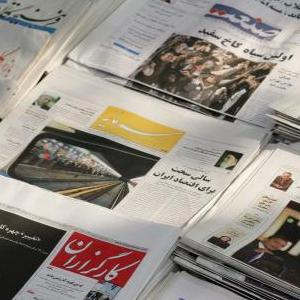Tehran's Daily Newspaper Review

“Lies and slanders diminish trust” (of the citizens), Etemaad quoted Ayatollah Hashemi Rafsanjani. Etemaad also reported of Abdullah Nuri’s –Minister of Interior in the first two years of Khatami's presidency who boycotted political activism following his imprisonment in the late 90s- preparing the ground for Reformists’ participation in the next parliamentary elections.
Mahmoud Ahmadinejad, who returned the accusations against his administration in Tuesday night’s interview with state-run TV, stated that he prefers to focus on the country’s move towards prosperity instead of paying attention to controversies. Iran also interviewed a number of experts who also believed that bickering over the financial corruption won’t serve the interests of people. In Iran’s editorial, Ali-Akbar Javanfekr spoke of the frequent subpoenas he has received since taking his new position as the government organ’s editor-in-chief, sardonically praising the Judiciary’s efficiency and rejecting critiques against it as a cumbersome bureaucracy.
“Practical revival of moral values is the most urgent need of our society” Jomhouri-ye Eslami quoted Akbar Hashemi Rafsanjani, the ayatollah who is apparently distressed over the current turmoil engulfing Iranian society and the government. Jomhouri-ye Eslami also reflected the remarks by Mohammad Dehqan, member of Majles’ presiding board, who called for the resignation of the Minister of Finance and the Central Bank Chairman. The newspaper’s editorial focused on the Wall Street protests and Americans’ dissatisfaction with their capitalist system.
Kayhan’s top headline was Bashar al-Assad’s blatant threat to upset the regional order if Syria comes under military attack. “US will burn in the regional fire,” Kayhan quoted Assad. The newspaper also cited Ayatollah Mesbah Yazdi, senior cleric and spiritual leader of the “Resistance Front” -a makeshift electoral alliance of former ministers of Ahmadinejad's administration- that “no rift will appear among the Principlists,” while many in the camp are disappointed over the Resistance Front’s refusal to join a united electoral campaign.
Resalat’s top headline was a “confession” by Zbigniew Brzezinski that “Obama has been defeated in the Middle East” and “Israel's entity is jeopardized.” It also quoted General Prosecutor, Judiciary Speaker and Special Investigator for the 2.6 billion dollar embezzlement case, who named the presidents of Melli and Saderat banks as the main culprits of the fraud.
Shargh reported of a four-hour meeting between Ezhe’i and defendants in the fraud scandal. A selection of Mohseni Ezhe’i’s remarks were also published, including an apology for his lack of oversight and his claim that power-holders have supported Mansour Aria, the main suspect in the case. The newspaper also focused on Hashemi Rafsanjani’s recent remarks, in which he warned of the erosion of people’s trust due to misleading remarks by the officials.
Tehran-e Emrooz top headline focused on the finalization of the blood money rate, which turned into a controversial issue after the Judiciary bumped it up from 60 million Tomans (roughly equal to 58 thousand USD) to 90 million, and which lead to strong protests by insurance companies. The new consensual rate is 67 million Tomans, effective in two weeks. Tehran-e Emrooz also ran a critical, lengthy report on the Resistance Front, suggesting that despite its appearance, behind the curtains the group is actually linked to Esfandiar Rahim Mashaei and his Astray Current and has on its agenda creating schism inside the Principlist camp.
Vatan-e Emrooz stuck to the protests in Wall Street and 70 other cities in the US, overwhelming the front page with a photo of a demonstrator holding a placard which read: “we want democracy, not a corporatocracy.” Ahmadinejad's remarks in his meeting with hajj officials, President Michel Suleyman’s call for Iran to equip the Lebanese Army, and the investigation proceedings of the 2.6 billion dollar embezzlement case were also covered by the newspaper.
* Notes:
The editorial section of Iranian newspapers is not the work of the editor-in-chief or the senior editorial staff of the newspaper by default, but can be a contribution by experts and politicians (typically agreeing with the newspaper’s political stance.)
Vatan-e Emrooz daily does not publish on Thursdays.
Trouble with understanding some terms? Check our Glossary of Iranian Political Terms.
Briefing
Etemaad is a Reformist newspaper owned by former MP Elias Hazrati. The newspaper supported Mehdi Karroubi in the 2005 and 2009 elections. In 2010, it was temporarily banned from publishing (for a three-month period) by the Judiciary.
Iran is the official organ of the administration. Its current editor-in-chief is Ali-Akbar Javanfekr, former media advisor to President Mahmoud Ahmadinejad.
Jomhouri-ye Eslami (The Islamic Republic) was known as the official organ of the Party of the Islamic Republic, founded in 1979 and disbanded in 1987. Currently, it is an open critique of Mahmoud Ahmadinejad's policies and is known to be a mouthpiece of Akbar Hashemi Rafsanjani.
Kayhan (Universe) is a hard-line conservative newspaper. Its editor-in-chief –currently Hossein Shari’atmadari- is directly appointed by Iran's Supreme Leader. Shari’atmadari’s editorials often spark off controversy and debate inside Iranian political circles.
Resalat (Mission) belongs to the moderate wing of the Principlist camp. Resalat’s best known analyst is Amir Mohebbian, its political editor.
Shargh (East) is a moderate Reformist newspaper. It was the most popular and influential Reformist newspaper in its first period of publication which lasted from August 2003 until September 2006.
Tehran-e Emrooz (Tehran Today) is a “Principlist/Reformist” newspaper, connected to Mohammad Baqer Qalibaf, Tehran Mayor and a likely candidate of the 2013 presidential election.

